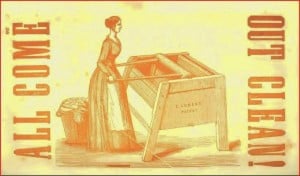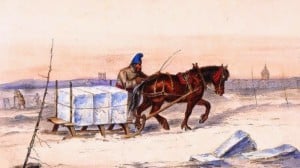Herman Ten Eyck Foster, Part 3
By Alice Askins, Education Coordinator at Rose Hill
At the end of December 1843 Herman Foster became engaged to Pauline Lentilhon. Pauline may have been related to the Smiths who appear so often in Herman’s diary. We first hear of Pauline when Augustus Smith was reading a letter from her in the cutter that spills Herman, Augustus, and William into a snow bank. After they were engaged, Pauline wrote to Herman frequently. He probably wrote back, but he does not mention that in his diary. In April 1844, Pauline came to stay with the Smiths, escorted by Charles Owen of the farm where Herman learned his profession. I don’t know how it came about that Charles assisted Pauline on her journey; if he happened to be in her home city of New York at the right time, she might have asked him to escort her as an acquaintance of her future husband. Women seem not to have traveled on their own. As a married man, a Quaker, and a friend of Herman’s, Charles would have been an eligible protector. Mrs. Smith, probably William and Augustus’s mother, was staying at the boys’ farm, and her presence would have made it acceptable for Pauline to stay there. On Sunday, April 5, Herman wrote “After dinner I rode over to Canoga and had the pleasure of once more seeing P.”
Every weekend through the summer he rode over to Canoga. On May 29 he wrote, “Afternoon the Boys, Mrs. Smith and Pauline came over and took tea.” In August, Herman mentioned that he took Pauline home to Canoga; she must have come to visit, perhaps to see the work on the farm. During this period Herman continued to improve the place. He brought a washing machine over from Geneva, and built an ice house. On September 16, Herman went to Canoga and “helped them get off” – apparently Pauline and some traveling companion(s) had started back to New York. On September 25, Herman followed. On Thursday October 17 he wrote, “We reached home in the evening.” “We” seems to mean Herman and Pauline, were now married.
Over the next few days, Herman wrote about unpacking furniture and fixing window blinds. “Thomas [a hired man?] came over to boys, took back a wad of Pauline’s things.” She must have left them there from her summer visit. Meanwhile, the social niceties were being observed – “23rd Wednesday. Great many persons have called on Pauline. 26th Saturday. I went in [to Geneva] and took Pauline – first time she ever was there. Called on Mrs. Clarke, Mrs. Bogert & Grosvenor.”
By November, after various references to lead pipes in dirt-filled boxes, and to forcing pumps, “At last the water runs as it ought to do – to our great joy.” At the end of the month, the boys brought over a piano. That must have made the house really feel like home for Herman, who had to have music. There are two later diary entries that Herman even brought in a piano tuner.
“December 25th Wednesday. Christmas day. . . Went to Seneca falls in morning in sleigh. . . Got some ice and made ice cream. Fired pistols at mark. Had grand supper in evening. . . .
26th Thursday. Fired pistols all day long, very much to P’s chagrin. She fussed in kitchen.
30th Monday. P fussed in kitchen all day, making cake, etc., in anticipation of New Year.” New Year’s Day was often devoted to visiting.
On November 4, 1845, “Pauline gave birth to a fine daughter at 6 minutes past ten P.M.” This was the first of three children (two daughters and a son). Sadly, Pauline died four and a half years after she married Herman. Robert Swan of Rose Hill mentions Herman in his own journal, and says once that he went to visit Herman because it was his (Herman’s) wedding day. We assume that he needed company on his anniversary. He never remarried. After an accident with a 500-pound block of ice Herman himself died in 1869. His leg was broken and a large blood clot was found in his windpipe and another in a lung after he died.
The Geneva Gazette said “Mr. Foster was a positive man – there was nothing negative in his character.” A former president of the New York State Agricultural Society, A. B. Conger, noted that Herman won farming awards from the county and state societies, and established and ran a Sunday School for the poorer families in his area. His diaries give us a strong impression of a lively man with a sense of humor. I tend to forget his social position, but one of his daughters married Henry Algernon DuPont and lived at Winterthur in Delaware. That is why Winterthur owns his diaries, and again we are indebted to them for sending us the transcripts.
Meet another Swan neighbor, John Delafield.


